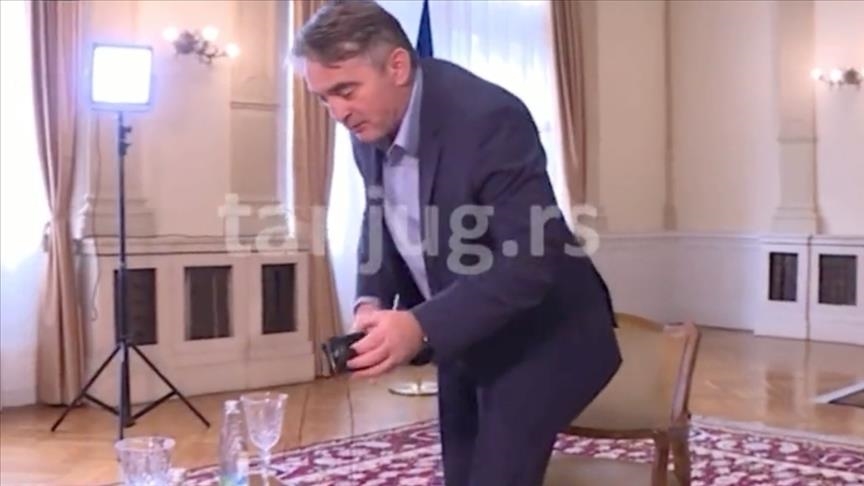Protesting genocide denial, Bosnian presidency official breaks off interview with Serbian news agency
Zeljko Komsic, chairman of Presidential Council of Bosnia and Herzegovina, walks off interview when journalist denies 1995 Srebrenica genocide

SARAJEVO, Bosnia and Herzegovina
When it emerged that his interviewer denied the Srebrenica genocide, the Croat member of Bosnia and Herzegovina's presidency broke off the interview and walked away.
Video of the Tuesday interview with Serbia's state-run news agency Tanjug quickly went viral, with Bosnians praising Zeljko Komsic for refusing to continue talking with someone who denies the genocide, a fact confirmed by both historians and international court rulings.
In the interview, Komsic, president of the Presidential Council of Bosnia and Herzegovina, stressed that the reality of the 1995 Srebrenica genocide is “very important.” Komsic then asked the interviewer why he would not recognize the genocide.
"A terrible crime was committed there (in Srebrenica)," the interviewer replied.
"No, a genocide was committed," explained Komsic. “That is what the verdicts of the international court say. Genocide is not a ‘terrible crime’. Some other crimes were terrible, but this is genocide.”
The journalist then claimed that the genocide characterization was a position particular to Komsic.
"No, that is not my position, it is written in the verdicts of the international court," Komsic asserted.
Asked whether he agreed with verdict, Komsic shot back: "Don’t you agree?"
"I do not agree with that verdict," the journalist said.
"Then you will have to do this interview with someone else. Enjoy Sarajevo," Komsic said, taking off his microphone and walking off the set.
Srebrenica genocide
In July 1995, more than 8,000 Bosnian Muslim men and boys were killed when Bosnian Serb forces attacked the town of Srebrenica, despite the presence of Dutch peacekeeping troops.
The Serb forces were trying to wrest territory from Bosnian Muslims and Croats to form a state.
In the spring of 1993 the UN Security Council had declared Srebrenica a “safe area.” However, troops led by Gen. Ratko Mladic – who was later found guilty of war crimes, crimes against humanity, and genocide – overran the UN zone.
Dutch troops failed to act as Serb forces occupied the area, killing some 2,000 men and boys on July 11 alone.
About 15,000 residents of Srebrenica fled to the surrounding mountains, but Serb troops hunted down and killed 6,000 more people.
Bodies of victims have been found in 570 different places in the country.
In 2007, the International Court of Justice in The Hague ruled that a genocide had been committed in Srebrenica.
On June 8, 2021, UN tribunal judges upheld a verdict sentencing Mladic to life in prison for the genocide as well as persecution, crimes against humanity, extermination, and other war crimes in Bosnia and Herzegovina.
* Writing by Jeyhun Aliyev from Ankara
Anadolu Agency website contains only a portion of the news stories offered to subscribers in the AA News Broadcasting System (HAS), and in summarized form. Please contact us for subscription options.


